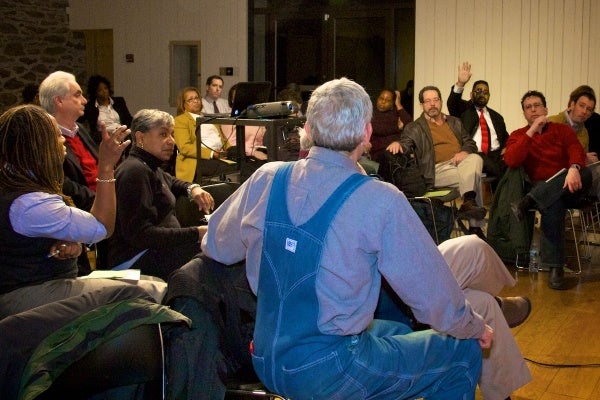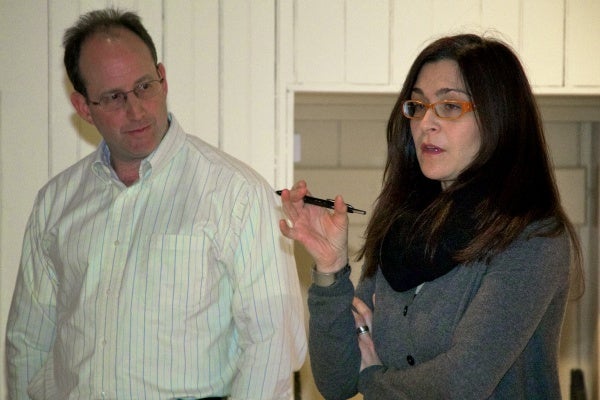Mt. Airy BID’s ten-year renewal plan raises some concerns
Should the Mt. Airy Business Improvement District (BID) seek a term of five years or 10 when it applies for charter renewal later this year? That was the question at the center of dialogue between property owners and BID board members. BID listened to suggestions and concerns at its first of two stakeholders’ meetings Wednesday evening at Cliveden.
Many of the property owners present voiced their concern that 10 years may be too long a term in an uncertain economy. BID board member Michael Schweisheimer stated that one advantage to seeking a 10 year term is that it establishes “a level of certainty” when applying for grant money. Projects involving such funds would benefit from “an organization that will be here in the neighborhood for the next decade,” he said.
Both BID Chair Ken Weinstein and board member Bob Elfant agreed that should a majority of BID’s constituency prefer a five year term, they would honor that. Business owner Iris Jenkins suggested that BID chart a side by side comparison of the benefits and differences for both term durations at the next meeting.
Another issue raised by several in attendance was BID’s assessment. BID currently levies 18 percent of the real estate tax assessed to property owners along Germantown Avenue by the City’s Board of Revision Taxes (BRT). For example: if the BRT has assessed a tax of $1000 on a property, the owner would pay an additional $180 to BID.
David Fellner, who owns the Sedgwick Theater expressed that he felt the current rate was too high and should be reviewed. BID’s Executive Director Hollie Malamud-Price acknowledged “our percentage may be higher” than other business improvement districts, but emphasized that BID’s budget is the smallest in Northwest Philadelphia. It was noted that, in comparison, Chestnut Hill draws from higher property taxes and therefore can assess a lower percentage rate. BID’s annual budget is $125,000.
Some of the uncertainty residents communicated was a fear of being “locked in” to the current assessment should BID’s board seek a 10 year renewal. However, it was noted that BID’s bylaws allow for the rate to be lower if the board choses. Property owners also have recourse to vote for or against BID’s all volunteer board, which is elected every two years.
Weinstein and Elfant stated that they would survey other business improvement districts’ budgets and assessments to see if the 18 precent rate decided on five years ago should be adjusted. “Now’s the time to do it,” Weinstein said.
The re-authorization process
After the second stakeholders meeting in April, BID’s board will decide together with Councilwoman Cindy Bass what renewal legislation she will introduce to City Council. BID needs City Council to vote in approval of the re-authorization. If approved, a letter will then be sent in September to all property owners along the commercial corridor outlining BID’s proposal, bylaws and ordinance. If 51 percent of stakeholders return forms to City Council indicating their disapproval, then BID will dissolve.
All present at Wednesday’s meeting were in agreement that BID has had a successful first five years. “We don’t want the services to go away,” exclaimed Jenkins. BID’s accomplishments include 50 Big Belly solar trash receptacles and more than 140 security lights installed on commercial properties along Germantown Avenue. Street cleaning services and beautification projects such as spring flower planters and holiday decor are a key part of BID’s mission to make the two mile commercial district attractive and safe. Malamud-Price noted that BID’s Avenue Ambassador street cleaning crew removes “4000 pounds of trash above and beyond what the city collects.”
“We want to stay within our mission but do more,” stated Ken Weinstein. Part of that goal would mean better leveraging of money by partnering with other neighborhood civic organizations like Mt. Airy USA (MAUSA). Weinstein stated that grant money is issued to those community associations that work together. He mentioned that BID used a portion of a $60,000 grant from the Philadelphia’s commerce department to help fund the Business Association of Mt. Airy (BAM), an initiative of MAUSA. Weinstein also noted that renewal plans include working with other Northwest Philadelphia business improvement districts to set future regional goals.
WHYY is your source for fact-based, in-depth journalism and information. As a nonprofit organization, we rely on financial support from readers like you. Please give today.












